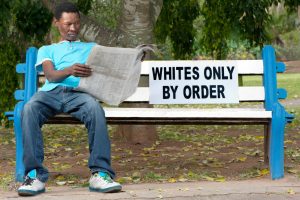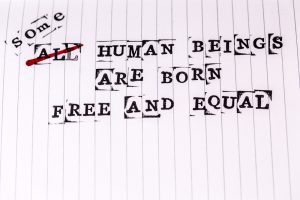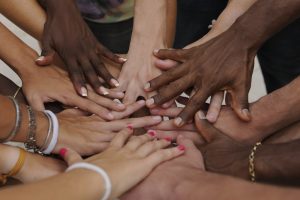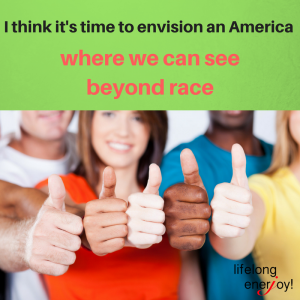Seven Underlying Causes of Racism

Many of us are disturbed by the increase of racial tensions that seems to be permeating the news these days. What I find especially upsetting is that this racial divide, especially between Blacks and Whites has not seemed to improve in many parts of the country for centuries.
I think it’s time that we envision an America where we can see beyond race.
I want to live in a country where we value each other’s cultures and experiences, where we try to forgive both ourselves and each other for past wrongs, and where we can recognize our privileges, and support those who don’t have the same opportunities.
But to first stop racism, we first have to understand what causes it in the first place.
1. The origins of racism in America
 One of the most enlightening videos on race, is Mathew Cooke’s video on race baiting. This video helped me understand that our racial tensions are perpetuated by those in power. As long as there is strife between the races, the rich and powerful won’t have to worry about the poor unifying to revolt against them. For a more thorough explanation, watch his brilliant video.
One of the most enlightening videos on race, is Mathew Cooke’s video on race baiting. This video helped me understand that our racial tensions are perpetuated by those in power. As long as there is strife between the races, the rich and powerful won’t have to worry about the poor unifying to revolt against them. For a more thorough explanation, watch his brilliant video.
2. Racist thoughts can be passed down epigenetically.
Racism ideology has been passed down through the generations, but it is not always through transgenerational interactions. Thoughts, emotions and beliefs can be passed down epigenetically, via tags on the DNA. As a healer, I regularly have to release inherited emotions and beliefs in order to clear habitual thinking. I have helped a Jewish client release the epigenetic fear of being chased down that came from a family who had experienced a few Houlocausts through the generations. I also helped a Japanese client release the epigenetic belief that Asian woman must be deferent to others. To learn more about epigenetics and inherited patterns, read my article, “How can I change an inherited problem? Introducing Epigenetics”.
3. We are shaped by our environment
As social beings, we cannot escape the impact of our environment. What our friends say and do, and how others react play a huge role in the formation of our opinions. Leaders and the media play a much more powerful role in shaping our opinion than we realize. Thus if we are in an environment where it is socially acceptable to ridicule a racial group, we will (unconsciously) be given permission to ridicule them as well. To learn about the power of our social networks read my article, “The Power of Our Friend’s Subconscious Influence”, and Why We Lack Control Over Our Thoughts”
4. Inequality fuels racial tensions
Epidemiologists analyzed data to determine what factors were most closely associated with hate crimes across all the states. They looked at education, diversity, geographic heterogeneity, economic health, income inequality and the percentage of people that voted for Trump. Income inequality was the strongest determinant of racial violence.
Why? Growing economic inequality means that while there are a few that get massively rich, there are more and more people fighting for less jobs and resources. It is easier to blame someone who looks less like us, who we believe is taking our jobs, than to blame the boss who could make it even harder for us to earn a living.
5. Many older people become more prejudiced
As we get older and wiser, the pathways in our brain become more well formed, but less flexible. Thus older people tend to be more rigid in their thinking, and are less able to adapt to novelty. Thus if a person has had an insular life, they will be less inclined to be open to new ways of thinking.
Also when we age, our frontal cortex functioning often declines. This affects our ability to make decisions, but it also impacts our ability to suppress undesirable behaviors. Without a filter, elderly are more likely to voice ideas that they would have been able to suppress at a younger age.
Most elderly people who start to show such declines retire, and thus the impact of the shifts is less salient. However the problem can be magnified if an elderly person who has lost the frontal lobe filter is in a position of power.
6. We are blind to our own privileges
 When we succeed, it is far more gratifying to think that we were responsible for our own success, and we tend to dismiss the luck and support we have experienced along the way. Because not having support and resources is far more limiting, we become much more aware of what gets in our way when we don’t have what we need.
When we succeed, it is far more gratifying to think that we were responsible for our own success, and we tend to dismiss the luck and support we have experienced along the way. Because not having support and resources is far more limiting, we become much more aware of what gets in our way when we don’t have what we need.
This idea is demonstrated in Dr. Paul Schiff’s TED Talk “Does Money Make You Mean?”. He ran experiments where college students played a rigged game of monopoly. While it was clear and obvious to both students that the game was rigged in favor of one of the students, when the more privileged student won, most students attributed their success to their own genius, and not to the fact that the game was rigged in their favor!
Our blindness to our own privilege is also beautifully illustrated in a powerful analogy by this school teacher. You can read about it here, and share it with others. When we don’t see the advantages we have, we are less inclined to be empathetic about the struggles that others have to face. This leads to less compassionate policies that have a greater impact on minorities, women and people with disabilities.
7. Inability to see our subconscious biases
It can often be tough to see our own prejudices. Even people who are sympathetic to the plight of minorities can find themselves making choices that reveal subconscious prejudice. One example is of a white man who had adapted an African American daughter, and yet one day found himself worried about his own safety when a Black man approached him late at night.
We can be consciously supportive of minorities, and yet subconsciously fearful. Researchers created a test called the IAT test, which you can take online to detect your subconscious biases. An interesting finding was that minority groups often have negative biases towards their own race. This shows how powerful the suggestions by our media and society are!
The discovery of our unconscious biases has underscored the importance of sensitivity training for police officers and others in law enforcement. When police are aware of their potential for unconscious bias, they can take active steps to make sure their actions are not based on stereotypes. This can go a long way to reducing ethnic tensions in the community.
Stereotypes are used by our brains to process i nformation quickly. But whether we see an ethnic group in a positive or negative light is determined much by our environment and our history. If we stay married to our old belief systems that were fueled by the people in power, and don’t question our inherent assumptions about race, then ethnic tensions could get a lot worse.
nformation quickly. But whether we see an ethnic group in a positive or negative light is determined much by our environment and our history. If we stay married to our old belief systems that were fueled by the people in power, and don’t question our inherent assumptions about race, then ethnic tensions could get a lot worse.
If we want to live in a truly Democratic society, where everyone has a chance at the American dream, then we need to first understand the causes of racism. Then we can implement solutions that will help us overcome our subconscious biases, and thus foster greater peace and understanding between racial groups.
What would you do to foster greater understanding between different racial groups? Please insert your comments below.
Did you like this article? If so, please share using the social media buttons below.





Please cite the evidence which supports the idea that, “many older people become more prejudiced”. This is an outrageous assertion based upon fallacious reasoning. WOW! get those older people to retire and out of power cause their brains don’t work anymore. You call that empiricism? You have fallen victim to the very biases you purport to reject.
Peter,
I can understand your anger. I realize that presupposition can ruffle some feathers. But there is plenty of research that supports that assertion. Here is an article on the subject: https://www.bbc.com/news/magazine-33523313
It makes sense given what happens as we age. The more our brains decline, the more we want to embrace the familiar, so we become more insular and eager to seek out members of our own tribe.
There may be exceptions to this, but this is according to research, the trend.